Intercultural Competence Report: Romanian and British Culture Analysis
VerifiedAdded on 2023/01/06
|9
|2466
|86
Report
AI Summary
This report delves into the realm of intercultural competence within a business context, primarily focusing on a comparative analysis between Romanian and British cultures. The report begins with cultural autobiographies of individuals from both backgrounds, highlighting key influences and cultural nuances. The core of the report involves a detailed comparison and contrast of the two cultures using established cultural frameworks. Specifically, it applies Hofstede's cultural dimensions (individualism vs. collectivism, power distance, masculinity vs. femininity, and uncertainty avoidance) and Handy's cultural theory (power, person, role, and task culture) to identify differences and similarities in values, communication styles, and work ethics. The report concludes by emphasizing the significance of understanding cultural differences for effective business operations and conflict resolution, offering valuable insights for management teams navigating a globalized business environment. References and a questionnaire used for gathering information are included.
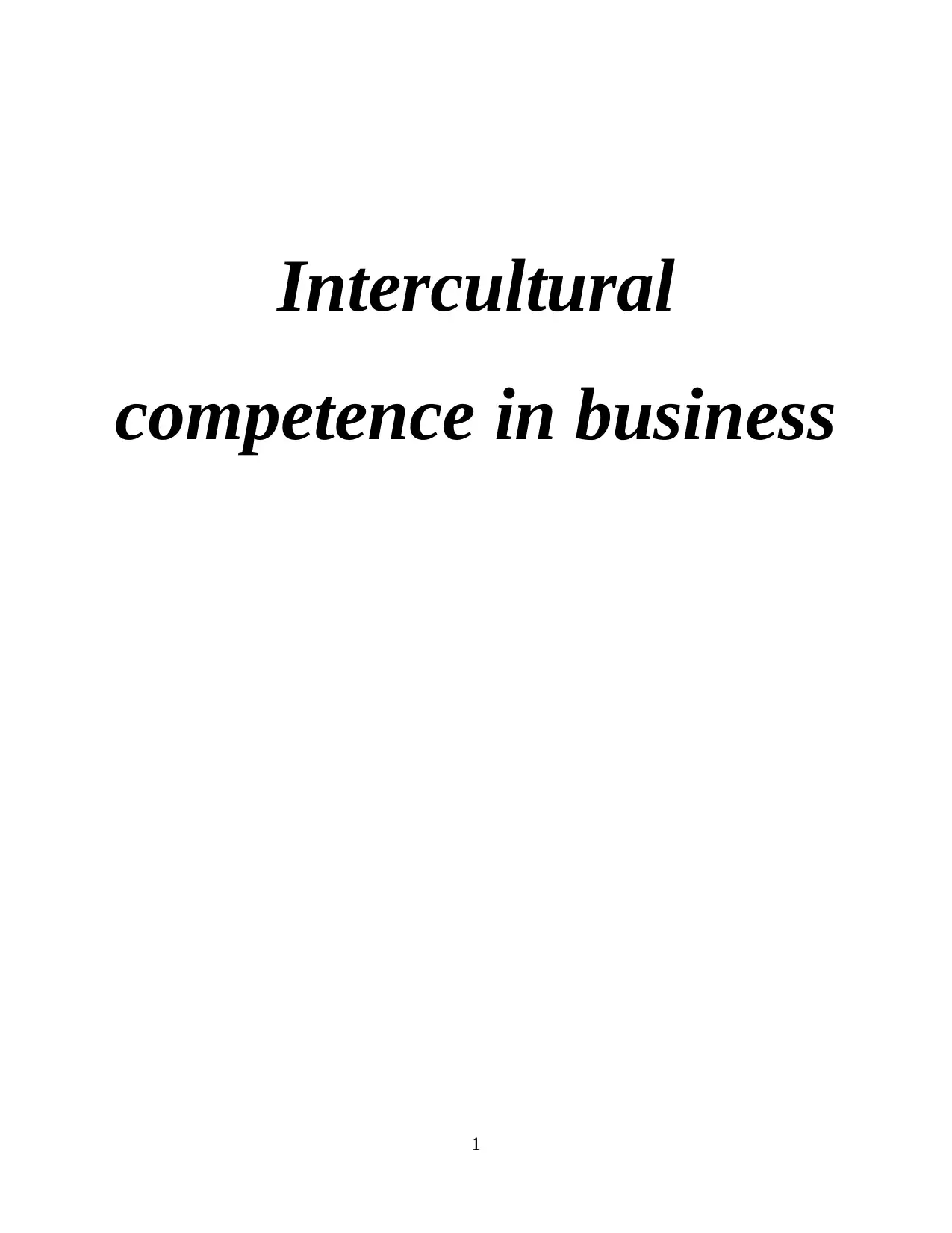
Intercultural
competence in business
1
competence in business
1
Paraphrase This Document
Need a fresh take? Get an instant paraphrase of this document with our AI Paraphraser
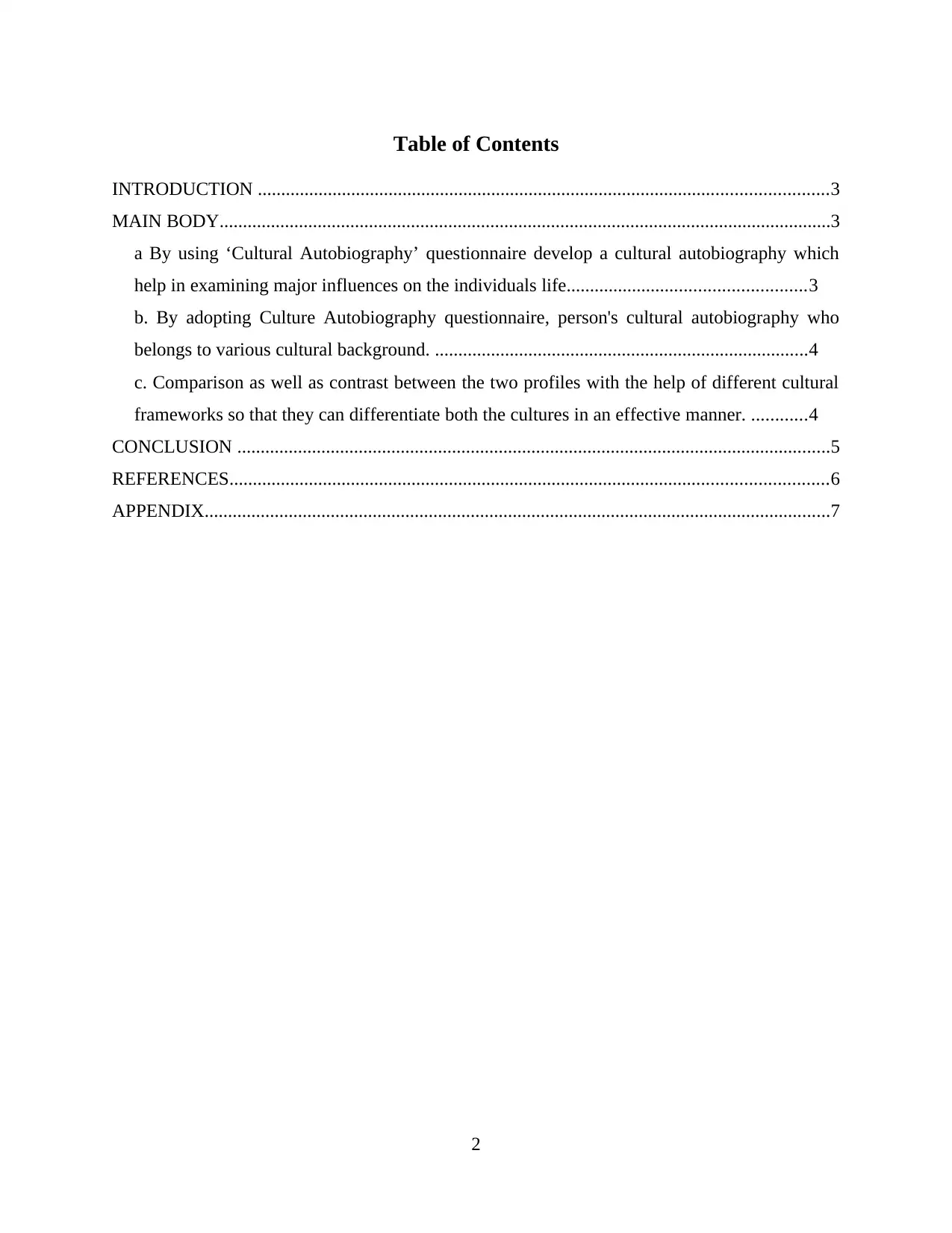
Table of Contents
INTRODUCTION ..........................................................................................................................3
MAIN BODY...................................................................................................................................3
a By using ‘Cultural Autobiography’ questionnaire develop a cultural autobiography which
help in examining major influences on the individuals life...................................................3
b. By adopting Culture Autobiography questionnaire, person's cultural autobiography who
belongs to various cultural background. ................................................................................4
c. Comparison as well as contrast between the two profiles with the help of different cultural
frameworks so that they can differentiate both the cultures in an effective manner. ............4
CONCLUSION ...............................................................................................................................5
REFERENCES................................................................................................................................6
APPENDIX......................................................................................................................................7
2
INTRODUCTION ..........................................................................................................................3
MAIN BODY...................................................................................................................................3
a By using ‘Cultural Autobiography’ questionnaire develop a cultural autobiography which
help in examining major influences on the individuals life...................................................3
b. By adopting Culture Autobiography questionnaire, person's cultural autobiography who
belongs to various cultural background. ................................................................................4
c. Comparison as well as contrast between the two profiles with the help of different cultural
frameworks so that they can differentiate both the cultures in an effective manner. ............4
CONCLUSION ...............................................................................................................................5
REFERENCES................................................................................................................................6
APPENDIX......................................................................................................................................7
2
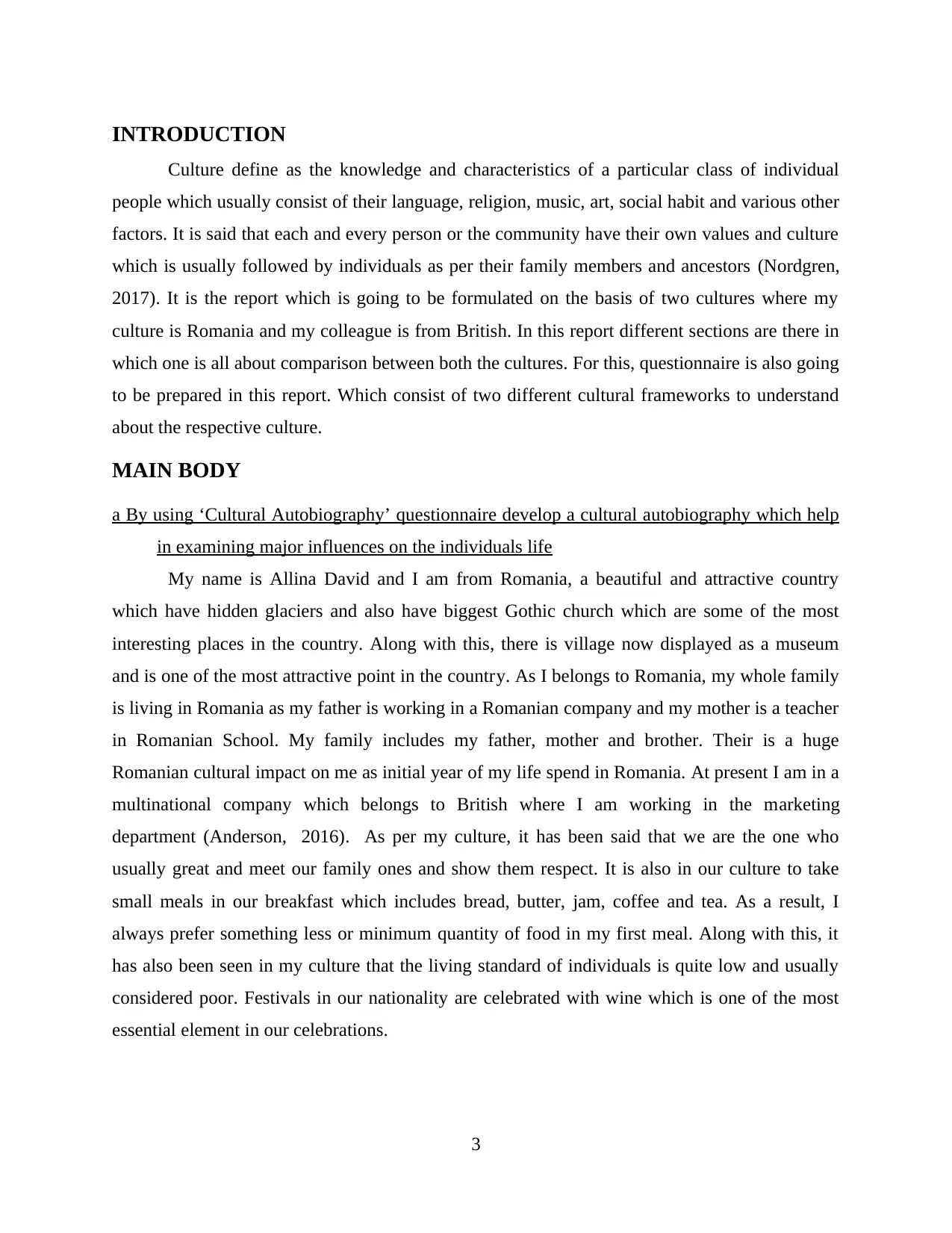
INTRODUCTION
Culture define as the knowledge and characteristics of a particular class of individual
people which usually consist of their language, religion, music, art, social habit and various other
factors. It is said that each and every person or the community have their own values and culture
which is usually followed by individuals as per their family members and ancestors (Nordgren,
2017). It is the report which is going to be formulated on the basis of two cultures where my
culture is Romania and my colleague is from British. In this report different sections are there in
which one is all about comparison between both the cultures. For this, questionnaire is also going
to be prepared in this report. Which consist of two different cultural frameworks to understand
about the respective culture.
MAIN BODY
a By using ‘Cultural Autobiography’ questionnaire develop a cultural autobiography which help
in examining major influences on the individuals life
My name is Allina David and I am from Romania, a beautiful and attractive country
which have hidden glaciers and also have biggest Gothic church which are some of the most
interesting places in the country. Along with this, there is village now displayed as a museum
and is one of the most attractive point in the country. As I belongs to Romania, my whole family
is living in Romania as my father is working in a Romanian company and my mother is a teacher
in Romanian School. My family includes my father, mother and brother. Their is a huge
Romanian cultural impact on me as initial year of my life spend in Romania. At present I am in a
multinational company which belongs to British where I am working in the marketing
department (Anderson, 2016). As per my culture, it has been said that we are the one who
usually great and meet our family ones and show them respect. It is also in our culture to take
small meals in our breakfast which includes bread, butter, jam, coffee and tea. As a result, I
always prefer something less or minimum quantity of food in my first meal. Along with this, it
has also been seen in my culture that the living standard of individuals is quite low and usually
considered poor. Festivals in our nationality are celebrated with wine which is one of the most
essential element in our celebrations.
3
Culture define as the knowledge and characteristics of a particular class of individual
people which usually consist of their language, religion, music, art, social habit and various other
factors. It is said that each and every person or the community have their own values and culture
which is usually followed by individuals as per their family members and ancestors (Nordgren,
2017). It is the report which is going to be formulated on the basis of two cultures where my
culture is Romania and my colleague is from British. In this report different sections are there in
which one is all about comparison between both the cultures. For this, questionnaire is also going
to be prepared in this report. Which consist of two different cultural frameworks to understand
about the respective culture.
MAIN BODY
a By using ‘Cultural Autobiography’ questionnaire develop a cultural autobiography which help
in examining major influences on the individuals life
My name is Allina David and I am from Romania, a beautiful and attractive country
which have hidden glaciers and also have biggest Gothic church which are some of the most
interesting places in the country. Along with this, there is village now displayed as a museum
and is one of the most attractive point in the country. As I belongs to Romania, my whole family
is living in Romania as my father is working in a Romanian company and my mother is a teacher
in Romanian School. My family includes my father, mother and brother. Their is a huge
Romanian cultural impact on me as initial year of my life spend in Romania. At present I am in a
multinational company which belongs to British where I am working in the marketing
department (Anderson, 2016). As per my culture, it has been said that we are the one who
usually great and meet our family ones and show them respect. It is also in our culture to take
small meals in our breakfast which includes bread, butter, jam, coffee and tea. As a result, I
always prefer something less or minimum quantity of food in my first meal. Along with this, it
has also been seen in my culture that the living standard of individuals is quite low and usually
considered poor. Festivals in our nationality are celebrated with wine which is one of the most
essential element in our celebrations.
3
⊘ This is a preview!⊘
Do you want full access?
Subscribe today to unlock all pages.

Trusted by 1+ million students worldwide
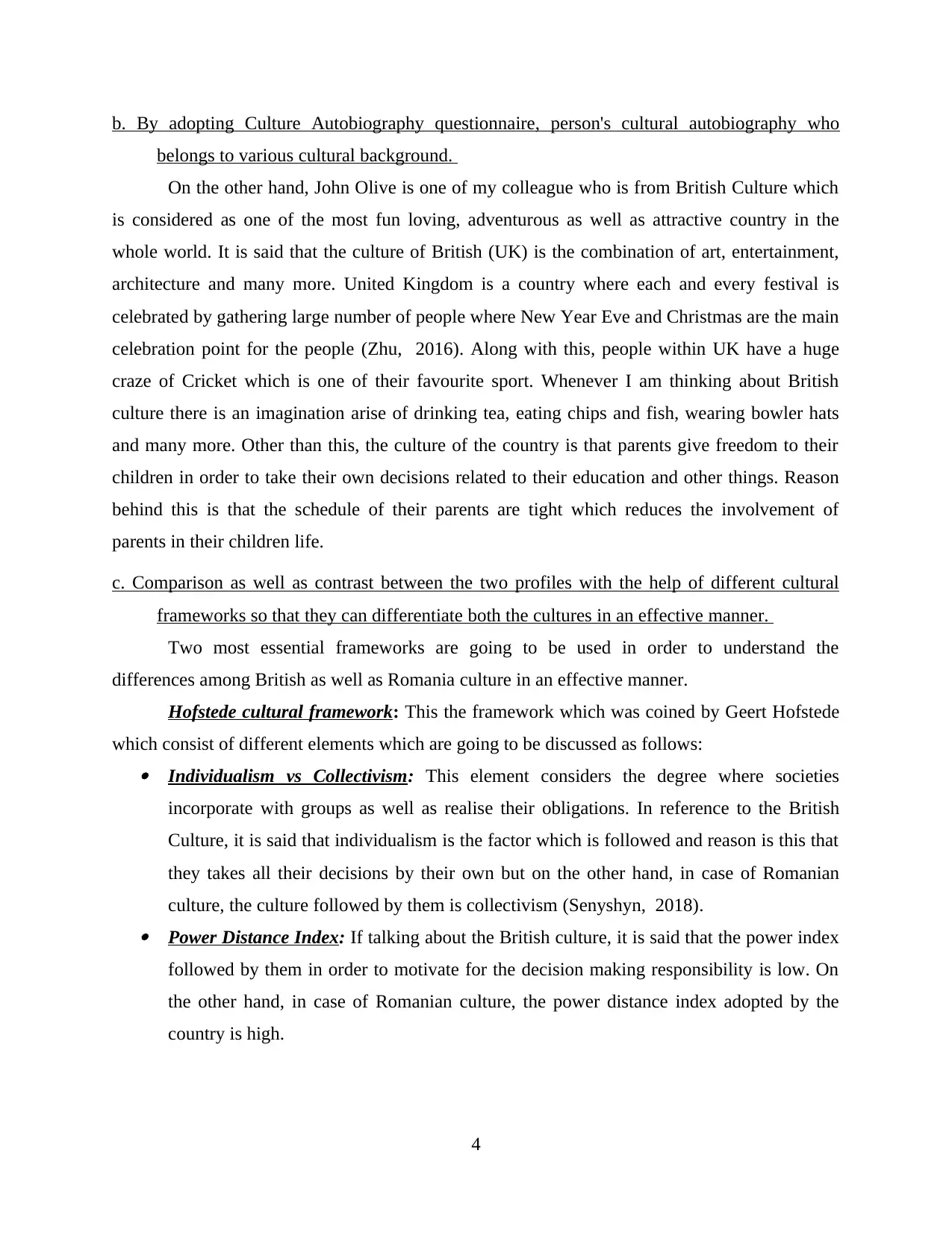
b. By adopting Culture Autobiography questionnaire, person's cultural autobiography who
belongs to various cultural background.
On the other hand, John Olive is one of my colleague who is from British Culture which
is considered as one of the most fun loving, adventurous as well as attractive country in the
whole world. It is said that the culture of British (UK) is the combination of art, entertainment,
architecture and many more. United Kingdom is a country where each and every festival is
celebrated by gathering large number of people where New Year Eve and Christmas are the main
celebration point for the people (Zhu, 2016). Along with this, people within UK have a huge
craze of Cricket which is one of their favourite sport. Whenever I am thinking about British
culture there is an imagination arise of drinking tea, eating chips and fish, wearing bowler hats
and many more. Other than this, the culture of the country is that parents give freedom to their
children in order to take their own decisions related to their education and other things. Reason
behind this is that the schedule of their parents are tight which reduces the involvement of
parents in their children life.
c. Comparison as well as contrast between the two profiles with the help of different cultural
frameworks so that they can differentiate both the cultures in an effective manner.
Two most essential frameworks are going to be used in order to understand the
differences among British as well as Romania culture in an effective manner.
Hofstede cultural framework: This the framework which was coined by Geert Hofstede
which consist of different elements which are going to be discussed as follows: Individualism vs Collectivism: This element considers the degree where societies
incorporate with groups as well as realise their obligations. In reference to the British
Culture, it is said that individualism is the factor which is followed and reason is this that
they takes all their decisions by their own but on the other hand, in case of Romanian
culture, the culture followed by them is collectivism (Senyshyn, 2018). Power Distance Index: If talking about the British culture, it is said that the power index
followed by them in order to motivate for the decision making responsibility is low. On
the other hand, in case of Romanian culture, the power distance index adopted by the
country is high.
4
belongs to various cultural background.
On the other hand, John Olive is one of my colleague who is from British Culture which
is considered as one of the most fun loving, adventurous as well as attractive country in the
whole world. It is said that the culture of British (UK) is the combination of art, entertainment,
architecture and many more. United Kingdom is a country where each and every festival is
celebrated by gathering large number of people where New Year Eve and Christmas are the main
celebration point for the people (Zhu, 2016). Along with this, people within UK have a huge
craze of Cricket which is one of their favourite sport. Whenever I am thinking about British
culture there is an imagination arise of drinking tea, eating chips and fish, wearing bowler hats
and many more. Other than this, the culture of the country is that parents give freedom to their
children in order to take their own decisions related to their education and other things. Reason
behind this is that the schedule of their parents are tight which reduces the involvement of
parents in their children life.
c. Comparison as well as contrast between the two profiles with the help of different cultural
frameworks so that they can differentiate both the cultures in an effective manner.
Two most essential frameworks are going to be used in order to understand the
differences among British as well as Romania culture in an effective manner.
Hofstede cultural framework: This the framework which was coined by Geert Hofstede
which consist of different elements which are going to be discussed as follows: Individualism vs Collectivism: This element considers the degree where societies
incorporate with groups as well as realise their obligations. In reference to the British
Culture, it is said that individualism is the factor which is followed and reason is this that
they takes all their decisions by their own but on the other hand, in case of Romanian
culture, the culture followed by them is collectivism (Senyshyn, 2018). Power Distance Index: If talking about the British culture, it is said that the power index
followed by them in order to motivate for the decision making responsibility is low. On
the other hand, in case of Romanian culture, the power distance index adopted by the
country is high.
4
Paraphrase This Document
Need a fresh take? Get an instant paraphrase of this document with our AI Paraphraser
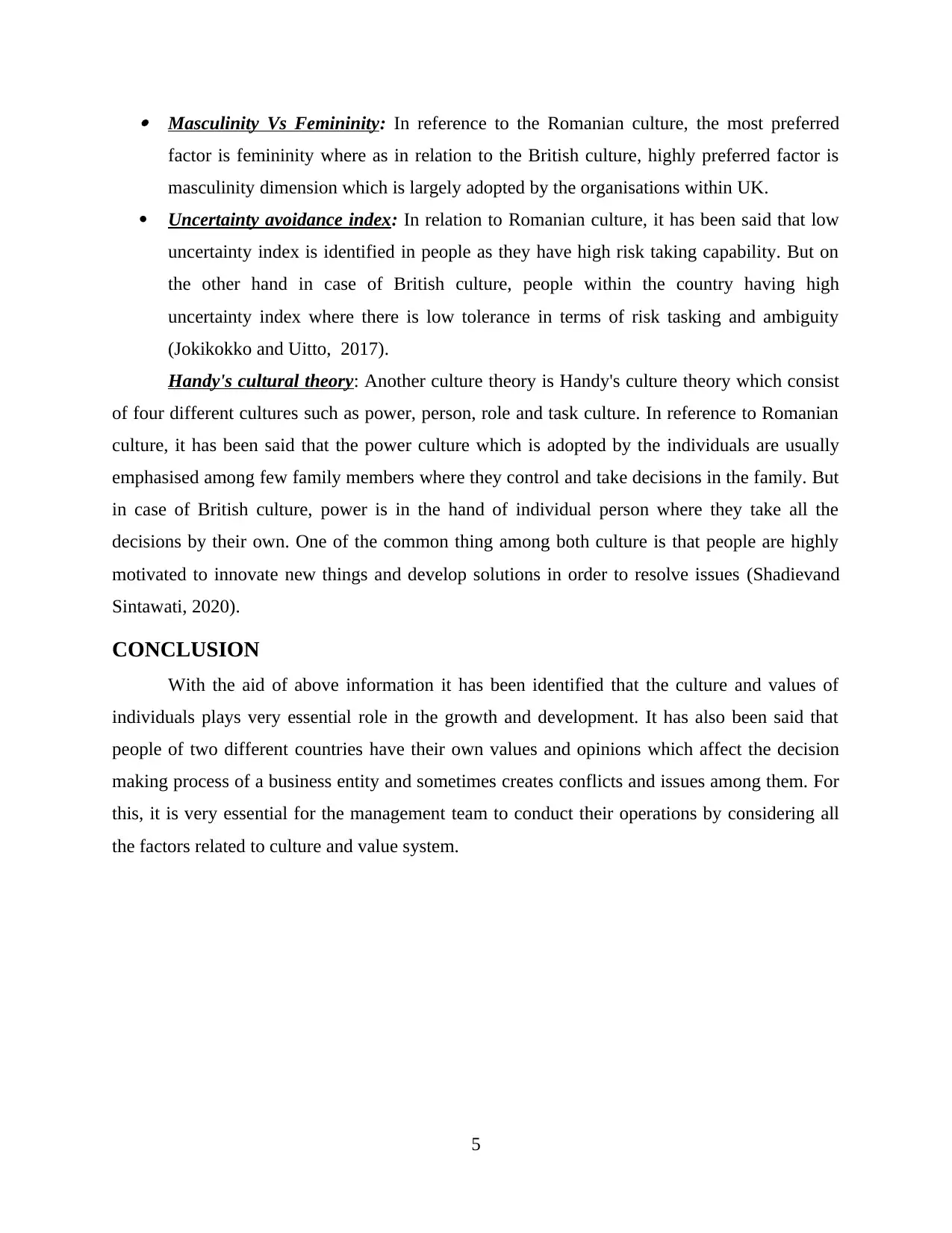
Masculinity Vs Femininity: In reference to the Romanian culture, the most preferred
factor is femininity where as in relation to the British culture, highly preferred factor is
masculinity dimension which is largely adopted by the organisations within UK.
Uncertainty avoidance index: In relation to Romanian culture, it has been said that low
uncertainty index is identified in people as they have high risk taking capability. But on
the other hand in case of British culture, people within the country having high
uncertainty index where there is low tolerance in terms of risk tasking and ambiguity
(Jokikokko and Uitto, 2017).
Handy's cultural theory: Another culture theory is Handy's culture theory which consist
of four different cultures such as power, person, role and task culture. In reference to Romanian
culture, it has been said that the power culture which is adopted by the individuals are usually
emphasised among few family members where they control and take decisions in the family. But
in case of British culture, power is in the hand of individual person where they take all the
decisions by their own. One of the common thing among both culture is that people are highly
motivated to innovate new things and develop solutions in order to resolve issues (Shadievand
Sintawati, 2020).
CONCLUSION
With the aid of above information it has been identified that the culture and values of
individuals plays very essential role in the growth and development. It has also been said that
people of two different countries have their own values and opinions which affect the decision
making process of a business entity and sometimes creates conflicts and issues among them. For
this, it is very essential for the management team to conduct their operations by considering all
the factors related to culture and value system.
5
factor is femininity where as in relation to the British culture, highly preferred factor is
masculinity dimension which is largely adopted by the organisations within UK.
Uncertainty avoidance index: In relation to Romanian culture, it has been said that low
uncertainty index is identified in people as they have high risk taking capability. But on
the other hand in case of British culture, people within the country having high
uncertainty index where there is low tolerance in terms of risk tasking and ambiguity
(Jokikokko and Uitto, 2017).
Handy's cultural theory: Another culture theory is Handy's culture theory which consist
of four different cultures such as power, person, role and task culture. In reference to Romanian
culture, it has been said that the power culture which is adopted by the individuals are usually
emphasised among few family members where they control and take decisions in the family. But
in case of British culture, power is in the hand of individual person where they take all the
decisions by their own. One of the common thing among both culture is that people are highly
motivated to innovate new things and develop solutions in order to resolve issues (Shadievand
Sintawati, 2020).
CONCLUSION
With the aid of above information it has been identified that the culture and values of
individuals plays very essential role in the growth and development. It has also been said that
people of two different countries have their own values and opinions which affect the decision
making process of a business entity and sometimes creates conflicts and issues among them. For
this, it is very essential for the management team to conduct their operations by considering all
the factors related to culture and value system.
5
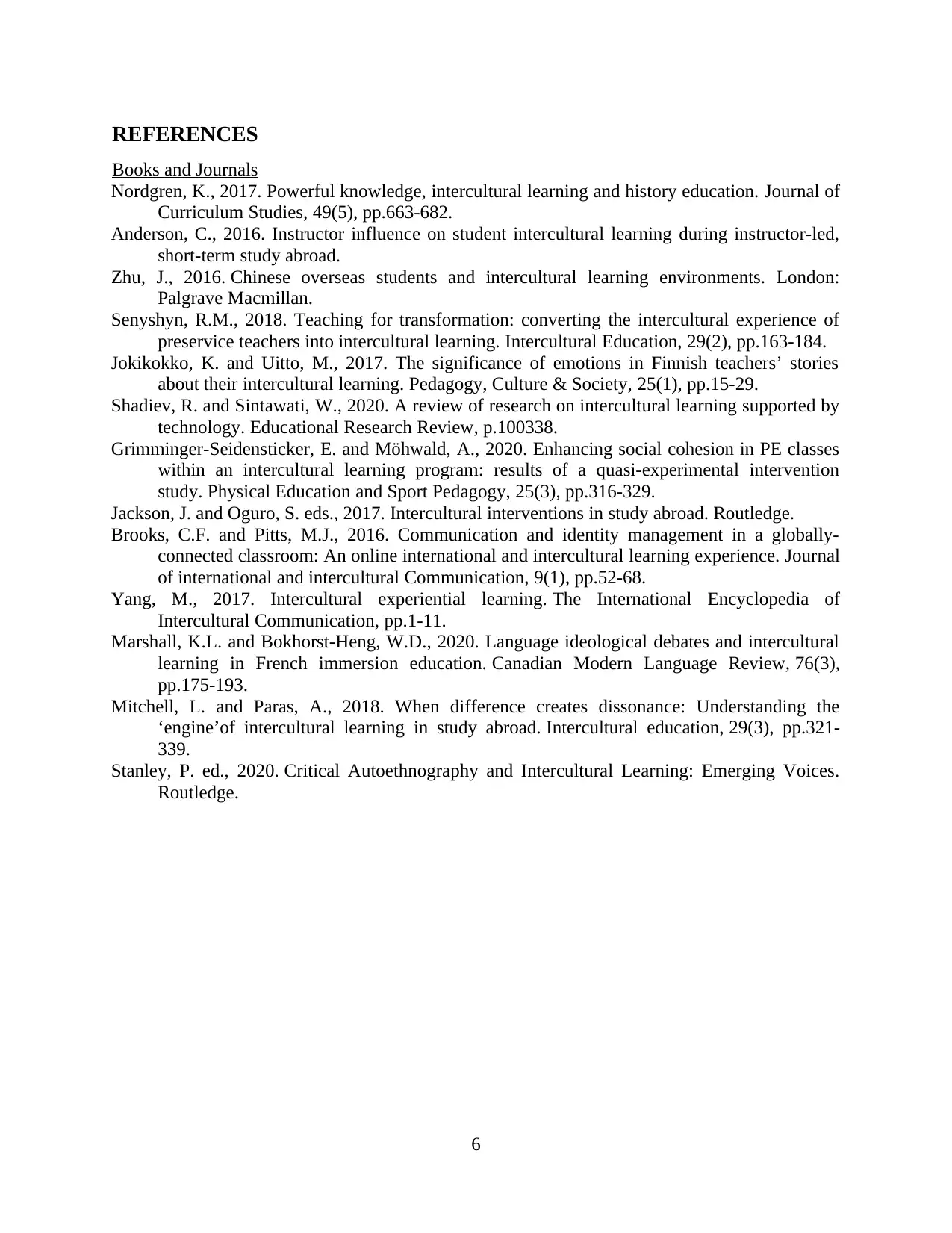
REFERENCES
Books and Journals
Nordgren, K., 2017. Powerful knowledge, intercultural learning and history education. Journal of
Curriculum Studies, 49(5), pp.663-682.
Anderson, C., 2016. Instructor influence on student intercultural learning during instructor-led,
short-term study abroad.
Zhu, J., 2016. Chinese overseas students and intercultural learning environments. London:
Palgrave Macmillan.
Senyshyn, R.M., 2018. Teaching for transformation: converting the intercultural experience of
preservice teachers into intercultural learning. Intercultural Education, 29(2), pp.163-184.
Jokikokko, K. and Uitto, M., 2017. The significance of emotions in Finnish teachers’ stories
about their intercultural learning. Pedagogy, Culture & Society, 25(1), pp.15-29.
Shadiev, R. and Sintawati, W., 2020. A review of research on intercultural learning supported by
technology. Educational Research Review, p.100338.
Grimminger-Seidensticker, E. and Möhwald, A., 2020. Enhancing social cohesion in PE classes
within an intercultural learning program: results of a quasi-experimental intervention
study. Physical Education and Sport Pedagogy, 25(3), pp.316-329.
Jackson, J. and Oguro, S. eds., 2017. Intercultural interventions in study abroad. Routledge.
Brooks, C.F. and Pitts, M.J., 2016. Communication and identity management in a globally-
connected classroom: An online international and intercultural learning experience. Journal
of international and intercultural Communication, 9(1), pp.52-68.
Yang, M., 2017. Intercultural experiential learning. The International Encyclopedia of
Intercultural Communication, pp.1-11.
Marshall, K.L. and Bokhorst-Heng, W.D., 2020. Language ideological debates and intercultural
learning in French immersion education. Canadian Modern Language Review, 76(3),
pp.175-193.
Mitchell, L. and Paras, A., 2018. When difference creates dissonance: Understanding the
‘engine’of intercultural learning in study abroad. Intercultural education, 29(3), pp.321-
339.
Stanley, P. ed., 2020. Critical Autoethnography and Intercultural Learning: Emerging Voices.
Routledge.
6
Books and Journals
Nordgren, K., 2017. Powerful knowledge, intercultural learning and history education. Journal of
Curriculum Studies, 49(5), pp.663-682.
Anderson, C., 2016. Instructor influence on student intercultural learning during instructor-led,
short-term study abroad.
Zhu, J., 2016. Chinese overseas students and intercultural learning environments. London:
Palgrave Macmillan.
Senyshyn, R.M., 2018. Teaching for transformation: converting the intercultural experience of
preservice teachers into intercultural learning. Intercultural Education, 29(2), pp.163-184.
Jokikokko, K. and Uitto, M., 2017. The significance of emotions in Finnish teachers’ stories
about their intercultural learning. Pedagogy, Culture & Society, 25(1), pp.15-29.
Shadiev, R. and Sintawati, W., 2020. A review of research on intercultural learning supported by
technology. Educational Research Review, p.100338.
Grimminger-Seidensticker, E. and Möhwald, A., 2020. Enhancing social cohesion in PE classes
within an intercultural learning program: results of a quasi-experimental intervention
study. Physical Education and Sport Pedagogy, 25(3), pp.316-329.
Jackson, J. and Oguro, S. eds., 2017. Intercultural interventions in study abroad. Routledge.
Brooks, C.F. and Pitts, M.J., 2016. Communication and identity management in a globally-
connected classroom: An online international and intercultural learning experience. Journal
of international and intercultural Communication, 9(1), pp.52-68.
Yang, M., 2017. Intercultural experiential learning. The International Encyclopedia of
Intercultural Communication, pp.1-11.
Marshall, K.L. and Bokhorst-Heng, W.D., 2020. Language ideological debates and intercultural
learning in French immersion education. Canadian Modern Language Review, 76(3),
pp.175-193.
Mitchell, L. and Paras, A., 2018. When difference creates dissonance: Understanding the
‘engine’of intercultural learning in study abroad. Intercultural education, 29(3), pp.321-
339.
Stanley, P. ed., 2020. Critical Autoethnography and Intercultural Learning: Emerging Voices.
Routledge.
6
⊘ This is a preview!⊘
Do you want full access?
Subscribe today to unlock all pages.

Trusted by 1+ million students worldwide
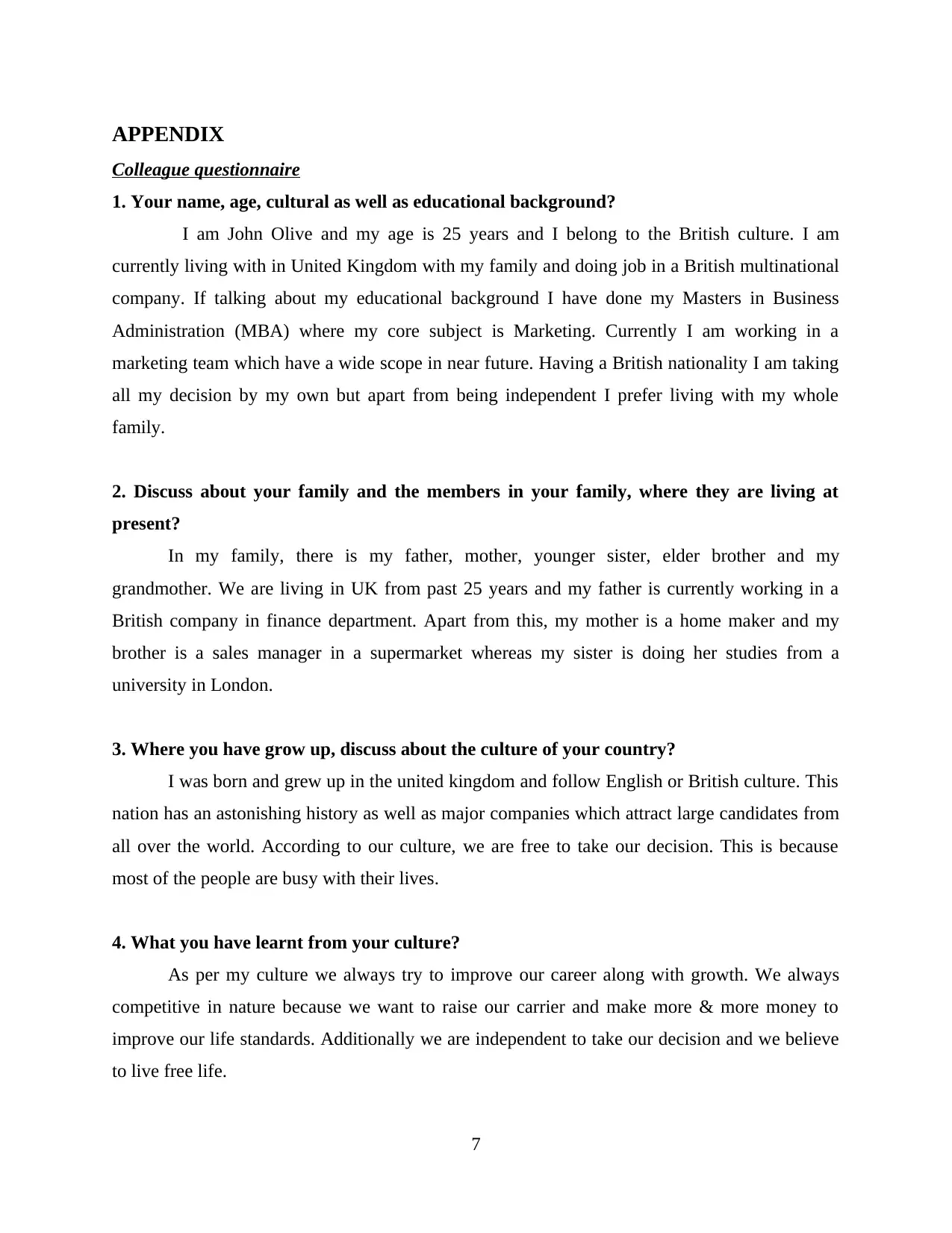
APPENDIX
Colleague questionnaire
1. Your name, age, cultural as well as educational background?
I am John Olive and my age is 25 years and I belong to the British culture. I am
currently living with in United Kingdom with my family and doing job in a British multinational
company. If talking about my educational background I have done my Masters in Business
Administration (MBA) where my core subject is Marketing. Currently I am working in a
marketing team which have a wide scope in near future. Having a British nationality I am taking
all my decision by my own but apart from being independent I prefer living with my whole
family.
2. Discuss about your family and the members in your family, where they are living at
present?
In my family, there is my father, mother, younger sister, elder brother and my
grandmother. We are living in UK from past 25 years and my father is currently working in a
British company in finance department. Apart from this, my mother is a home maker and my
brother is a sales manager in a supermarket whereas my sister is doing her studies from a
university in London.
3. Where you have grow up, discuss about the culture of your country?
I was born and grew up in the united kingdom and follow English or British culture. This
nation has an astonishing history as well as major companies which attract large candidates from
all over the world. According to our culture, we are free to take our decision. This is because
most of the people are busy with their lives.
4. What you have learnt from your culture?
As per my culture we always try to improve our career along with growth. We always
competitive in nature because we want to raise our carrier and make more & more money to
improve our life standards. Additionally we are independent to take our decision and we believe
to live free life.
7
Colleague questionnaire
1. Your name, age, cultural as well as educational background?
I am John Olive and my age is 25 years and I belong to the British culture. I am
currently living with in United Kingdom with my family and doing job in a British multinational
company. If talking about my educational background I have done my Masters in Business
Administration (MBA) where my core subject is Marketing. Currently I am working in a
marketing team which have a wide scope in near future. Having a British nationality I am taking
all my decision by my own but apart from being independent I prefer living with my whole
family.
2. Discuss about your family and the members in your family, where they are living at
present?
In my family, there is my father, mother, younger sister, elder brother and my
grandmother. We are living in UK from past 25 years and my father is currently working in a
British company in finance department. Apart from this, my mother is a home maker and my
brother is a sales manager in a supermarket whereas my sister is doing her studies from a
university in London.
3. Where you have grow up, discuss about the culture of your country?
I was born and grew up in the united kingdom and follow English or British culture. This
nation has an astonishing history as well as major companies which attract large candidates from
all over the world. According to our culture, we are free to take our decision. This is because
most of the people are busy with their lives.
4. What you have learnt from your culture?
As per my culture we always try to improve our career along with growth. We always
competitive in nature because we want to raise our carrier and make more & more money to
improve our life standards. Additionally we are independent to take our decision and we believe
to live free life.
7
Paraphrase This Document
Need a fresh take? Get an instant paraphrase of this document with our AI Paraphraser
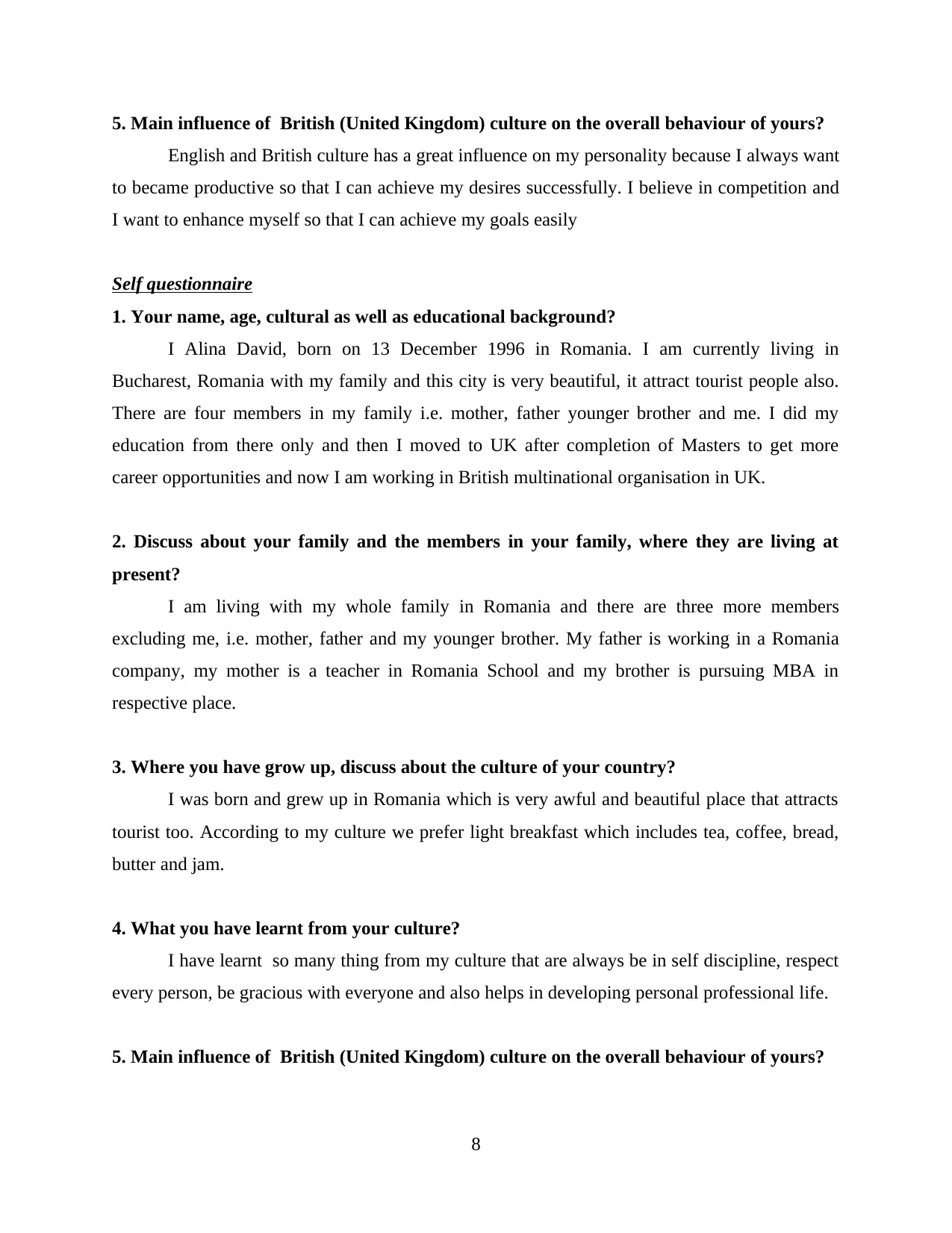
5. Main influence of British (United Kingdom) culture on the overall behaviour of yours?
English and British culture has a great influence on my personality because I always want
to became productive so that I can achieve my desires successfully. I believe in competition and
I want to enhance myself so that I can achieve my goals easily
Self questionnaire
1. Your name, age, cultural as well as educational background?
I Alina David, born on 13 December 1996 in Romania. I am currently living in
Bucharest, Romania with my family and this city is very beautiful, it attract tourist people also.
There are four members in my family i.e. mother, father younger brother and me. I did my
education from there only and then I moved to UK after completion of Masters to get more
career opportunities and now I am working in British multinational organisation in UK.
2. Discuss about your family and the members in your family, where they are living at
present?
I am living with my whole family in Romania and there are three more members
excluding me, i.e. mother, father and my younger brother. My father is working in a Romania
company, my mother is a teacher in Romania School and my brother is pursuing MBA in
respective place.
3. Where you have grow up, discuss about the culture of your country?
I was born and grew up in Romania which is very awful and beautiful place that attracts
tourist too. According to my culture we prefer light breakfast which includes tea, coffee, bread,
butter and jam.
4. What you have learnt from your culture?
I have learnt so many thing from my culture that are always be in self discipline, respect
every person, be gracious with everyone and also helps in developing personal professional life.
5. Main influence of British (United Kingdom) culture on the overall behaviour of yours?
8
English and British culture has a great influence on my personality because I always want
to became productive so that I can achieve my desires successfully. I believe in competition and
I want to enhance myself so that I can achieve my goals easily
Self questionnaire
1. Your name, age, cultural as well as educational background?
I Alina David, born on 13 December 1996 in Romania. I am currently living in
Bucharest, Romania with my family and this city is very beautiful, it attract tourist people also.
There are four members in my family i.e. mother, father younger brother and me. I did my
education from there only and then I moved to UK after completion of Masters to get more
career opportunities and now I am working in British multinational organisation in UK.
2. Discuss about your family and the members in your family, where they are living at
present?
I am living with my whole family in Romania and there are three more members
excluding me, i.e. mother, father and my younger brother. My father is working in a Romania
company, my mother is a teacher in Romania School and my brother is pursuing MBA in
respective place.
3. Where you have grow up, discuss about the culture of your country?
I was born and grew up in Romania which is very awful and beautiful place that attracts
tourist too. According to my culture we prefer light breakfast which includes tea, coffee, bread,
butter and jam.
4. What you have learnt from your culture?
I have learnt so many thing from my culture that are always be in self discipline, respect
every person, be gracious with everyone and also helps in developing personal professional life.
5. Main influence of British (United Kingdom) culture on the overall behaviour of yours?
8
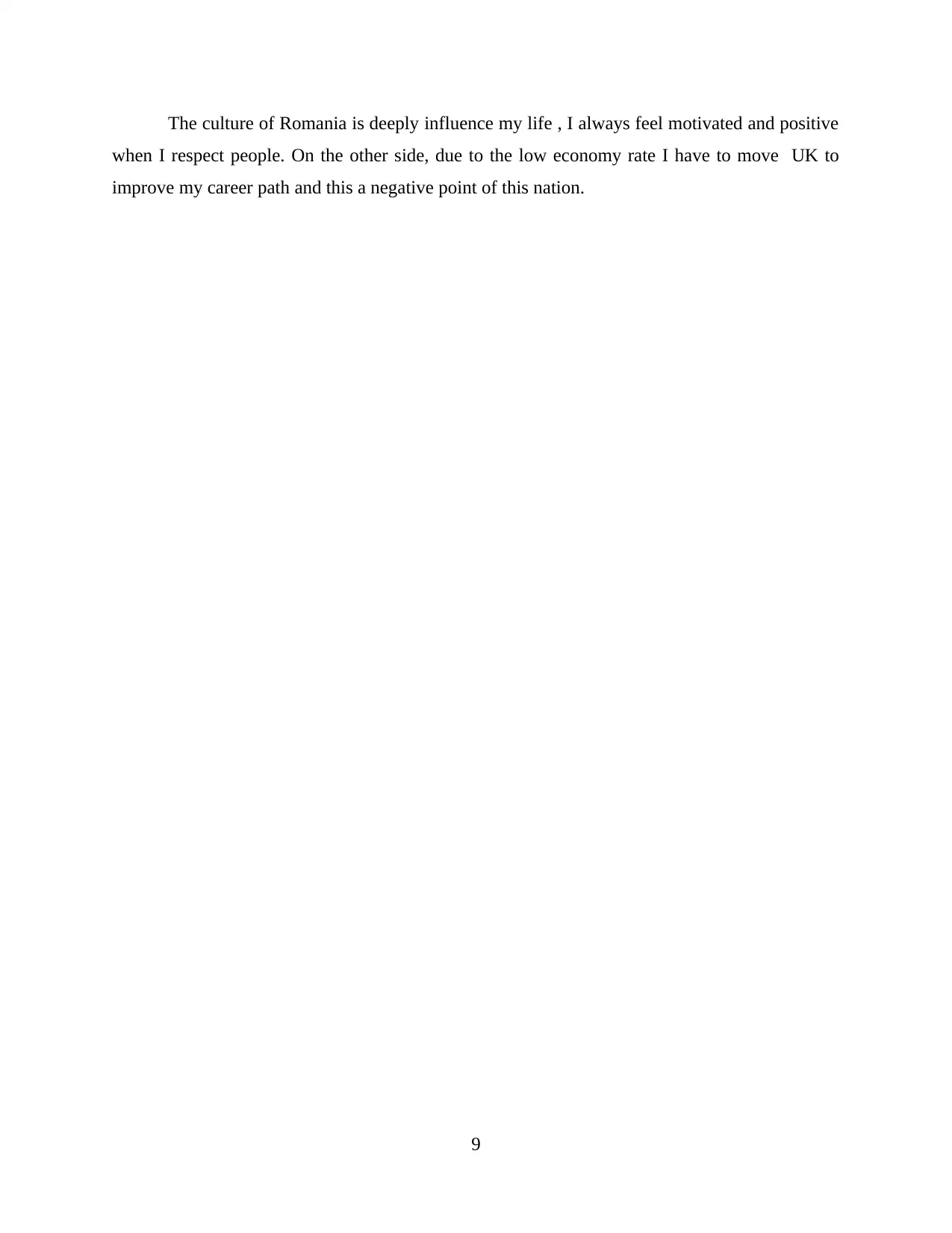
The culture of Romania is deeply influence my life , I always feel motivated and positive
when I respect people. On the other side, due to the low economy rate I have to move UK to
improve my career path and this a negative point of this nation.
9
when I respect people. On the other side, due to the low economy rate I have to move UK to
improve my career path and this a negative point of this nation.
9
⊘ This is a preview!⊘
Do you want full access?
Subscribe today to unlock all pages.

Trusted by 1+ million students worldwide
1 out of 9
Related Documents
Your All-in-One AI-Powered Toolkit for Academic Success.
+13062052269
info@desklib.com
Available 24*7 on WhatsApp / Email
![[object Object]](/_next/static/media/star-bottom.7253800d.svg)
Unlock your academic potential
Copyright © 2020–2026 A2Z Services. All Rights Reserved. Developed and managed by ZUCOL.





